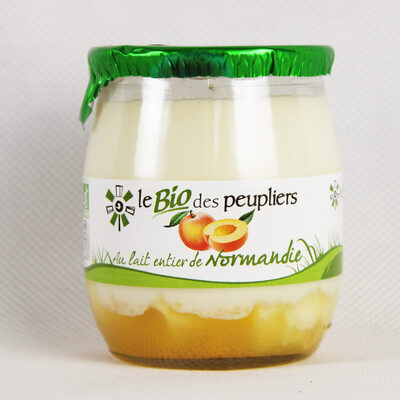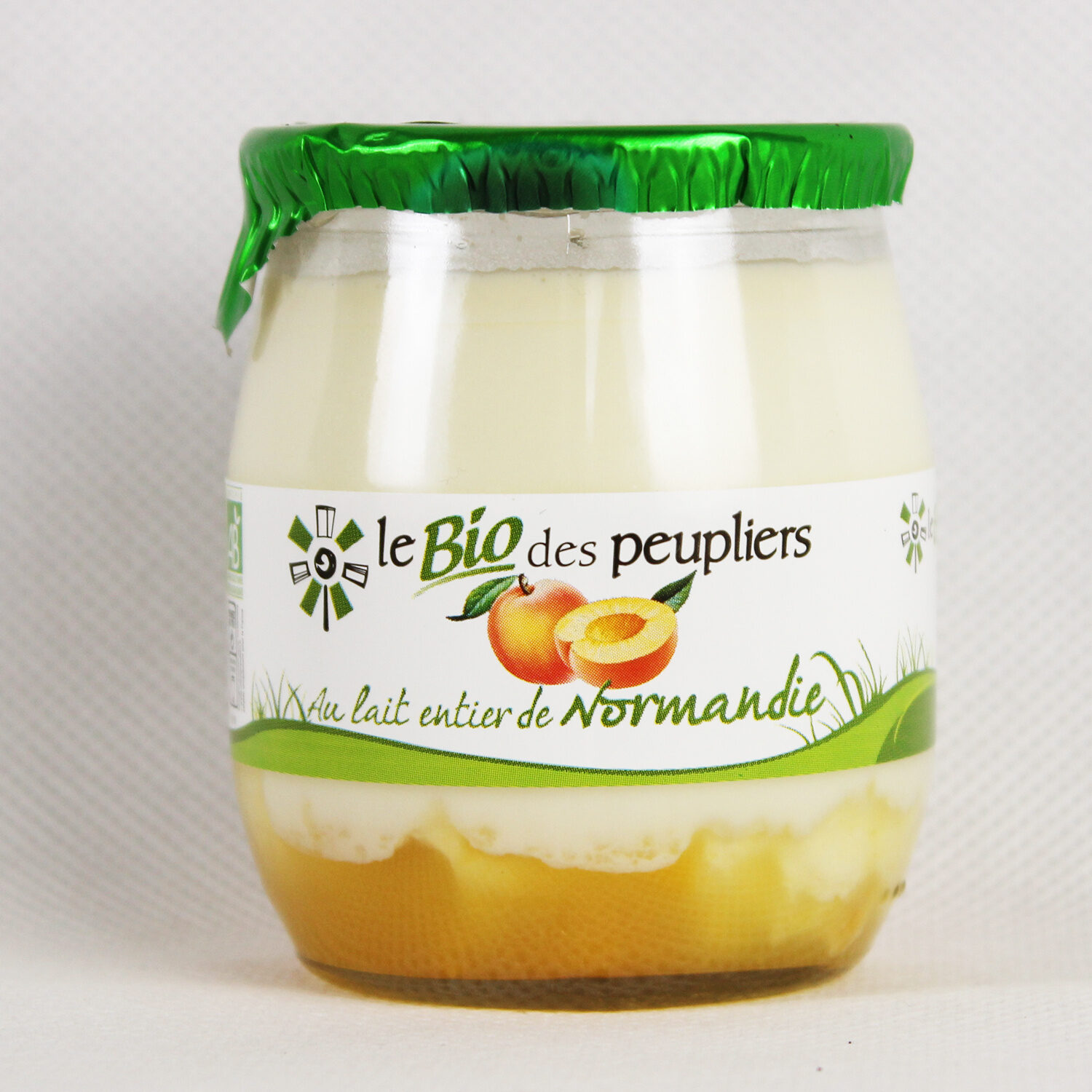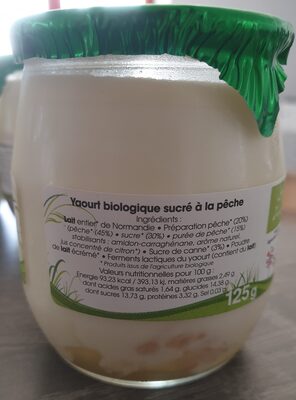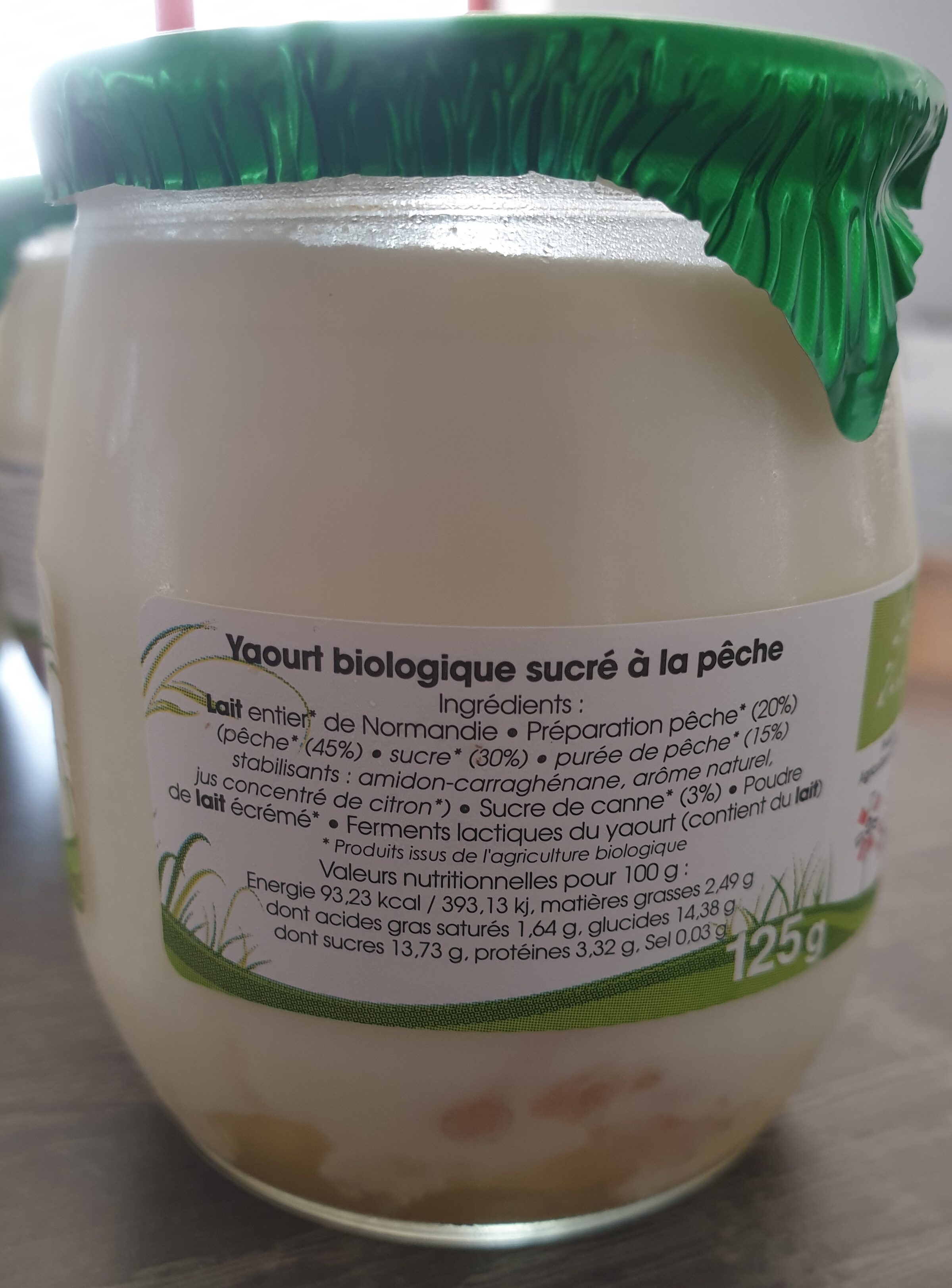Help us make food transparency the norm!
As a non-profit organization, we depend on your donations to continue informing consumers around the world about what they eat.
The food revolution starts with you!
Organic peach yoghurt - Bio des Peupliers - 125g
Organic peach yoghurt - Bio des Peupliers - 125g
This product page is not complete. You can help to complete it by editing it and adding more data from the photos we have, or by taking more photos using the app for Android or iPhone/iPad. Thank you!
×
Barcode: 3374270900047 (EAN / EAN-13)
Common name: Organic peach yoghurt
Quantity: 125g
Packaging: Glass, Pot, fr:Pot en verre
Brands: Bio des Peupliers, Ferme des Peupliers
Categories: Dairies, Fermented foods, Fermented milk products, Desserts, Dairy desserts, Fermented dairy desserts, Fermented dairy desserts with fruits, Yogurts, Fruit yogurts, Peach yogurts, fr:Yaourts biologique
Labels, certifications, awards:
Organic, EU Organic, Fed without GMOs, No GMOs, AB Agriculture Biologique

Manufacturing or processing places: France, Normandie, Fretteville
Traceability code: FR 27.247.001 CE - Flipou (Eure, France)
Countries where sold: France
Matching with your preferences
Health
Ingredients
-
14 ingredients
Organic whole milk* Normandy origin from animals fed without GMO (<0.9%), biological peach preparation* (20%) (peach* (45%), sugar* (30%), peach pureee* (15%), stabilizing agent : starch-carraghenan, naturl aroma, lemon concentred juice*), cane sugar* (3%), skimmed milk powder, lactic culture. *From organic farming, certified by ECOCERT FR-BIO-01Allergens: Milk
Food processing
-
Ultra processed foods
Elements that indicate the product is in the 4 - Ultra processed food and drink products group:
- Additive: E407 - Carrageenan
- Ingredient: Flavouring
Food products are classified into 4 groups according to their degree of processing:
- Unprocessed or minimally processed foods
- Processed culinary ingredients
- Processed foods
- Ultra processed foods
The determination of the group is based on the category of the product and on the ingredients it contains.
Additives
-
E407 - Carrageenan
Carrageenan (E407), derived from red seaweed, is widely employed in the food industry as a gelling, thickening, and stabilizing agent, notably in dairy and meat products.
It can exist in various forms, each imparting distinct textural properties to food.
However, its degraded form, often referred to as poligeenan, has raised health concerns due to its potential inflammatory effects and its classification as a possible human carcinogen (Group 2B) by the International Agency for Research on Cancer (IARC).
Nevertheless, food-grade carrageenan has been deemed safe by various regulatory bodies when consumed in amounts typically found in food.
Ingredients analysis
-
Palm oil content unknown
Unrecognized ingredients: fr:preparation-peche, fr:ecocert-fr-01Some ingredients could not be recognized.
We need your help!
You can help us recognize more ingredients and better analyze the list of ingredients for this product and others:
- Edit this product page to correct spelling mistakes in the ingredients list, and/or to remove ingredients in other languages and sentences that are not related to the ingredients.
- Add new entries, synonyms or translations to our multilingual lists of ingredients, ingredient processing methods, and labels.
If you would like to help, join the #ingredients channel on our Slack discussion space and/or learn about ingredients analysis on our wiki. Thank you!
-
Non-vegan
Non-vegan ingredients: Whole milk, Skimmed milk powderSome ingredients could not be recognized.
We need your help!
You can help us recognize more ingredients and better analyze the list of ingredients for this product and others:
- Edit this product page to correct spelling mistakes in the ingredients list, and/or to remove ingredients in other languages and sentences that are not related to the ingredients.
- Add new entries, synonyms or translations to our multilingual lists of ingredients, ingredient processing methods, and labels.
If you would like to help, join the #ingredients channel on our Slack discussion space and/or learn about ingredients analysis on our wiki. Thank you!
-
Vegetarian status unknown
Unrecognized ingredients: fr:preparation-peche, fr:ecocert-fr-01Some ingredients could not be recognized.
We need your help!
You can help us recognize more ingredients and better analyze the list of ingredients for this product and others:
- Edit this product page to correct spelling mistakes in the ingredients list, and/or to remove ingredients in other languages and sentences that are not related to the ingredients.
- Add new entries, synonyms or translations to our multilingual lists of ingredients, ingredient processing methods, and labels.
If you would like to help, join the #ingredients channel on our Slack discussion space and/or learn about ingredients analysis on our wiki. Thank you!
-
Details of the analysis of the ingredients
We need your help!
Some ingredients could not be recognized.
We need your help!
You can help us recognize more ingredients and better analyze the list of ingredients for this product and others:
- Edit this product page to correct spelling mistakes in the ingredients list, and/or to remove ingredients in other languages and sentences that are not related to the ingredients.
- Add new entries, synonyms or translations to our multilingual lists of ingredients, ingredient processing methods, and labels.
If you would like to help, join the #ingredients channel on our Slack discussion space and/or learn about ingredients analysis on our wiki. Thank you!
fr: Lait entier 0.9%, préparation pêche 20% (pêche 45%, sucre 30%, purée de pêche 15%, stabilisants (amidon), carraghénane, arôme naturel, jus concentré de citron), sucre de canne 3%, poudre de lait écrémé, ferments lactiques, ECOCERT FR- -01- Lait entier -> en:whole-milk - labels: en:fed-without-gmos, en:organic - vegan: no - vegetarian: yes - ciqual_food_code: 19023 - percent: 0.9
- préparation pêche -> fr:preparation-peche - labels: en:organic - percent: 20
- pêche -> en:peach - labels: en:organic - vegan: yes - vegetarian: yes - percent: 45
- sucre -> en:sugar - labels: en:organic - vegan: yes - vegetarian: yes - ciqual_proxy_food_code: 31016 - percent: 30
- purée de pêche -> en:peach-puree - labels: en:organic - vegan: yes - vegetarian: yes - ciqual_food_code: 13043 - percent: 15
- stabilisants -> en:stabiliser
- amidon -> en:starch - vegan: yes - vegetarian: yes - ciqual_proxy_food_code: 9510
- carraghénane -> en:e407 - vegan: yes - vegetarian: yes
- arôme naturel -> en:natural-flavouring - vegan: maybe - vegetarian: maybe
- jus concentré de citron -> en:concentrated-lemon-juice - labels: en:organic - vegan: yes - vegetarian: yes - ciqual_food_code: 2028
- sucre de canne -> en:cane-sugar - labels: en:organic - vegan: yes - vegetarian: yes - ciqual_proxy_food_code: 31016 - percent: 3
- poudre de lait écrémé -> en:skimmed-milk-powder - labels: en:organic - vegan: no - vegetarian: yes - ciqual_food_code: 19054
- ferments lactiques -> en:lactic-ferments - vegan: maybe - vegetarian: yes
- ECOCERT FR- -01 -> fr:ecocert-fr-01 - labels: en:organic
Nutrition
-
Good nutritional quality
⚠ ️Warning: the amount of fiber is not specified, their possible positive contribution to the grade could not be taken into account.⚠ ️Warning: the amount of fruits, vegetables and nuts is not specified on the label, it was estimated from the list of ingredients: 60This product is not considered a beverage for the calculation of the Nutri-Score.
Positive points: 3
- Proteins: 2 / 5 (value: 3.32, rounded value: 3.32)
- Fiber: 0 / 5 (value: 0, rounded value: 0)
- Fruits, vegetables, nuts, and colza/walnut/olive oils: 1 / 5 (value: 60, rounded value: 60)
Negative points: 5
- Energy: 1 / 10 (value: 390, rounded value: 390)
- Sugars: 3 / 10 (value: 13.73, rounded value: 13.73)
- Saturated fat: 1 / 10 (value: 1.64, rounded value: 1.6)
- Sodium: 0 / 10 (value: 12, rounded value: 12)
The points for proteins are counted because the negative points are less than 11.
Nutritional score: (5 - 3)
Nutri-Score:
-
Nutrient levels
-
Fat in low quantity (2.49%)
What you need to know- A high consumption of fat, especially saturated fats, can raise cholesterol, which increases the risk of heart diseases.
Recommendation: Limit the consumption of fat and saturated fat- Choose products with lower fat and saturated fat content.
-
Saturated fat in moderate quantity (1.64%)
What you need to know- A high consumption of fat, especially saturated fats, can raise cholesterol, which increases the risk of heart diseases.
Recommendation: Limit the consumption of fat and saturated fat- Choose products with lower fat and saturated fat content.
-
Sugars in high quantity (13.7%)
What you need to know- A high consumption of sugar can cause weight gain and tooth decay. It also augments the risk of type 2 diabetes and cardio-vascular diseases.
Recommendation: Limit the consumption of sugar and sugary drinks- Sugary drinks (such as sodas, fruit beverages, and fruit juices and nectars) should be limited as much as possible (no more than 1 glass a day).
- Choose products with lower sugar content and reduce the consumption of products with added sugars.
-
Salt in low quantity (0.03%)
What you need to know- A high consumption of salt (or sodium) can cause raised blood pressure, which can increase the risk of heart disease and stroke.
- Many people who have high blood pressure do not know it, as there are often no symptoms.
- Most people consume too much salt (on average 9 to 12 grams per day), around twice the recommended maximum level of intake.
Recommendation: Limit the consumption of salt and salted food- Reduce the quantity of salt used when cooking, and don't salt again at the table.
- Limit the consumption of salty snacks and choose products with lower salt content.
-
-
Nutrition facts
Nutrition facts As sold
for 100 g / 100 mlCompared to: Peach yogurts Energy 390 kj
(93 kcal)+4% Fat 2.49 g +14% Saturated fat 1.64 g +21% Carbohydrates 14.38 g +13% Sugars 13.73 g +16% Fiber ? Proteins 3.32 g -8% Salt 0.03 g -74% Fruits‚ vegetables‚ nuts and rapeseed‚ walnut and olive oils (estimate from ingredients list analysis) 60 %
Environment
-
Eco-Score A - Very low environmental impact
⚠ ️Select a country in order to include the full impact of transportation.The Eco-Score is an experimental score that summarizes the environmental impacts of food products.→ The Eco-Score was initially developped for France and it is being extended to other European countries. The Eco-Score formula is subject to change as it is regularly improved to make it more precise and better suited to each country.Life cycle analysis
-
Average impact of products of the same category: A (Score: 83/100)
Category: Yogurt, fermented milk or dairy specialty, with fruits, with sugar, fortified with vitamin D
Category: Yogurt, fermented milk or dairy specialty, with fruits, with sugar, fortified with vitamin D
- PEF environmental score: 0.25 (the lower the score, the lower the impact)
- including impact on climate change: 2.14 kg CO2 eq/kg of product
Stage Impact Agriculture
70.4 %Processing
11.8 %Packaging
6.0 %Transportation
7.4 %Distribution
3.5 %Consumption
1.0 %
Bonuses and maluses
-
Labels with high environmental benefits
Bonus: +15
-
AB Agriculture Biologique
Organic agriculture contributes to preserve biodiversity, climate, water quality and soil fertility.
Organic food is food produced by methods complying with the standards of organic farming and features practices that cycle resources, promote ecological balance, and conserve biodiversity.
-
EU Organic
Organic agriculture contributes to preserve biodiversity, climate, water quality and soil fertility.
Organic food is food produced by methods complying with the standards of organic farming and features practices that cycle resources, promote ecological balance, and conserve biodiversity.
-
-
Origins of ingredients with a high impact
Malus: -5
Environmental policy: -5
Transportation: 0
Origin of the product and/or its ingredients % of ingredients Impact Unknown 99 %High France 1 %Medium
-
Packaging with a low impact
Malus: -2
Shape Material Recycling Impact Pot Glass Low
Eco-Score for this product
-
Impact for this product: A (Score: 91/100)
Product: Organic peach yoghurt - Bio des Peupliers - 125g
Life cycle analysis score: 83
Sum of bonuses and maluses: +8
Final score: 91/100
-
Carbon footprint
-
Equal to driving 1.1 km in a petrol car
214 g CO² per 100g of product
The carbon emission figure comes from ADEME's Agribalyse database, for the category: Yogurt, fermented milk or dairy specialty, with fruits, with sugar, fortified with vitamin D (Source: ADEME Agribalyse Database)
Stage Impact Agriculture
71.6 %Processing
7.0 %Packaging
8.4 %Transportation
11.1 %Distribution
1.7 %Consumption
0.3 %
Packaging
-
Packaging with a low impact
-
Packaging parts
Pot (Glass)
-
Packaging materials
Material % Packaging weight Packaging weight per 100 g of product Glass
-
Transportation
-
Origins of ingredients
Origins of ingredients with a high impact
Origin of the product and/or its ingredients % of ingredients Impact Unknown 99 %High France 1 %Medium
Labels
-
AB Agriculture Biologique
Organic agriculture contributes to preserve biodiversity, climate, water quality and soil fertility.
Organic food is food produced by methods complying with the standards of organic farming and features practices that cycle resources, promote ecological balance, and conserve biodiversity.
-
EU Organic
Organic agriculture contributes to preserve biodiversity, climate, water quality and soil fertility.
Organic food is food produced by methods complying with the standards of organic farming and features practices that cycle resources, promote ecological balance, and conserve biodiversity.
Report a problem
-
Incomplete or incorrect information?
Category, labels, ingredients, allergens, nutritional information, photos etc.
If the information does not match the information on the packaging, please complete or correct it. Open Food Facts is a collaborative database, and every contribution is useful for all.
Data sources
Product added on by carole-anne
Last edit of product page on by fix-serving-size-bot.
Product page also edited by packbot.











